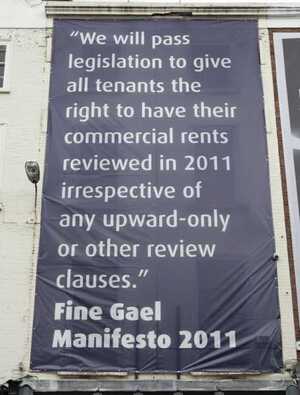 [Retail Excellence of Ireland banners in 20102]
[Retail Excellence of Ireland banners in 20102]
It was a landmark decision that might have changed EVERYTHING in the world of shop renting in Dublin.
BUT earlier today the Supreme Court reversed the judgment in Ickendel Limited-v-Bewley’s Cafe (forcing Bewleys to continue paying upwards of €1.46 million a year in rent).
We asked Legal Coffee Drinker, what’on earth is it all about.
Broadsheet: “Legal Coffee Drinker, what on earth is it all about?”
LCD: “Upwards only rent review clauses.”
Broadsheet: “What does that actually mean?”
LCD: “Most commercial leases provide for rent review every five years or so. If the lease pre-dates the 28th February 2010 – when the provisions of the Land and Conveyancing Law Reform Act 2009 modifying rent review clauses came into effect – most likely it also contains an upwards only rent review clause.”
Broadsheet: “How is it inserted in the lease agreement?”
LCD: The most common way is to provide in the reddendum (the section of the lease dealing with the rent), that the rent shall be a specified sum until the date of the rent review and after that the rent payable for the immediately preceding period or market rent as of the review date, whichever is the greater.
The effect of this is that even if rents generally go down, the landlord is guaranteed that the rent remain the highest rent previously payable under the Lease. In other words, the rent can only go upwards, never downwards, which is where the term ‘upwards only’ comes from.
Broadsheet: And what’s that got to do with the Ickendel Vs whatsit case?
LCD: “The reddendum in the Bewleys lease differs slightly from the standard form and the tenant was seeking to rely on this difference to argue that the lease was not a full ‘upwards-only’ lease. The tenant’s argument was that the effect of the clause was the rent could, in circumstances where market rents were declining, reduce from that payable on previous reviews so long as that reduction did not take it below the initial rent.
The reddendum in Bewleys reads as follows:-
“YIELDING AND PAYING therefor . . . . FIRST the clear YEARLY RENT of . . . [IR£168,000] and thereafter during each of the successive periods of five years of which the first shall begin on [1st January 1992] a rent …. equal to the greater of (a) the rent payable hereunder during the preceding period or (b) such revised rent as may from time to time be ascertained in accordance with the provisions in that behalf contained in Clause 6 hereof (whichever shall be the greater) . . “
Broadsheet: “How does this differ from the standard ‘upwards only’ provision?”
LCD: Well, the difference is in the highlighted portion (a) above ‘the rent payable hereunder during the preceding period’. The standard reddendum normally reads ‘the rent payable hereunder during the immediately preceding period’.
Broadsheet: “Um.”
LCD: “Bewleys argued that, in the absence of the prior word ‘immediately’, the words ‘the preceding period’ were ambiguous and could be read as either (i) the first five year period of the lease or (ii) the particular five year period immediately preceding the review. They also argued that, where there was ambiguity in a lease, the lease should be given a fair commercial interpretation, which, in a context of declining rents, favoured the upwards only element being interpreted narrowly i.e. (i) rather than (ii). This was accepted by Charleton J in the High Court.
The Supreme Court accepted that the interpretative principles applied by Charleton J were correct. In other words, he was right to look first to see if there was ambiguity, and that he was right, if there was ambiguity, to interpret the upwards only element narrowly.”
Broadsheet: “So what’s the problem with the …”
LCD: “…However [pause] they differed with him on his application of the law to the facts, in that they felt that the terms of the reddendum set out above were unambiguous. Even though the word ‘immediately’ did not expressly appear before the words ‘preceding period’, it was implicit from the terms of the clause, read as a whole. ‘Period’ in the portion highlighted in black above, must necessarily refer back to the words ‘successive periods of five years’ referenced in the clause rather than the initial period of five years during which the initial rent of £168,000 was payable.”
Broadsheet: “Do you agree with the Supreme Court?”
LCD: [refills coffee] As a matter of contract law, yes. I think if you read the reddendum as a whole, there is no ambiguity, for the reasons set out by them above. As a matter of justice – the operation of upwards-only rent review clauses can be extremely unfair, from a practical point of view, in a situation of rental collapse, especially where there is a long period of time left to run on the lease so that the tenant cannot simply walk away from it.
Broadsheet; “What should the Supreme Court apply, law or justice?”
LCD: “I think the job of the courts is to apply the law of contract except where that law clearly violates human rights or the Constitution. There was no human rights or constitutional challenge in this case. Nor was there any argument that the combination of rental collapse and the upwards only rent review provision frustrated the lease.”
Broadsheet: “Will this issue continue to arise again in the future?”
LCD: “Yes. There are a lot of pre-2010 leases around which contain upwards-only rent review clauses.”
Broadsheet: “Can the legislature change the law so as to limit the upwards only effect of these clauses?”
LCD: “Yes, subject to this not being unconstitutional or in breach of human rights.”
Broadsheet: “Can the tenant walk away from these leases?”
LCD: “No. Not unless there is a break clause, or unless the frustration argument outlined above succeeds.”
Broadsheet: “Could the leases be held to be frustrated?”
LCD: “Unlikely, according to the law of contractual frustration as it stands (very narrow view of frustration), but not absolutely impossible.”
Broadsheet: “What happens if the tenant walks away anyway?”
LCD: “An interesting question.”
Broadsheet: “I was saving it. Thanks.”
LCD: [Drains cup]: The landlord could in theory continue suing the tenant for the rent even after they have vacated. However there is also the question of whether or not the landlord is under a duty to minimise their loss by finding a new tenant, albeit at a reduced rent, and sue the tenant for the difference. UK law has held that a landlord is not under an obligation to do this, but the position in Ireland is unclear. If the Irish courts were to find such a duty to be present, it would limit the tenant’s liability to the difference between the market rent and the rent payable under the upwards only clause.”
Broadsheet: “Are we likely to find out the answer to this?”
LCD: “Yes. In many cases, tenants are walking away and coming to a settlement with the landlord – primarily because the tenant’s financial position is not secure enough for the landlord to be certain that they are a good ‘mark’ for the higher rent for the duration of the lease. When landlords are faced with a very financially secure tenant, however, they are unlikely to let them out of an upwards only lease. In such case, it might be worth the tenant’s while taking a legal challenge on one of the points above – constitutionality, frustration or duty to minimise. Whether any of these will succeed is another question…”
Broadsheet: “In the meantime Bewley’s will need to sell a lot more cups of Joe.”
LCD: “Right.”
Broadsheet: “Raise the price on their sticky buns while they’re at it eh?”
LCD: “Are we done?”
Broadsheet: “Thank you very much Legal Coffee Drinker. You’re like a jolt of Nespresso.”
LCD: “Goodbye.”
Previously: Onwards Not Upwards
Earlier: The Best Small Country In The World In Which To Do Business





